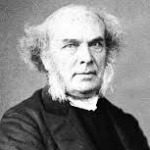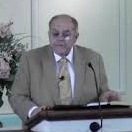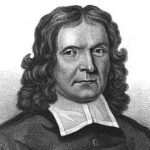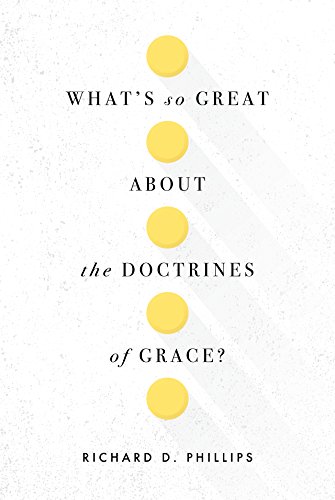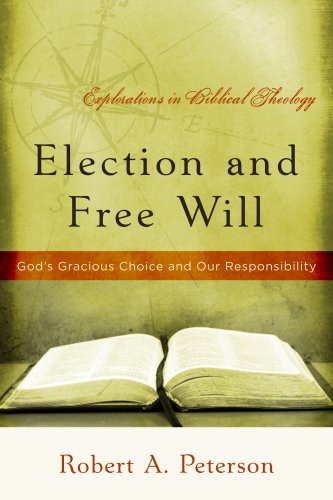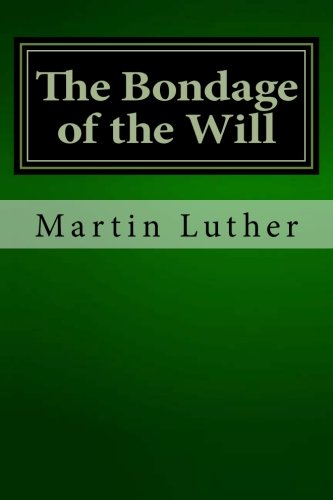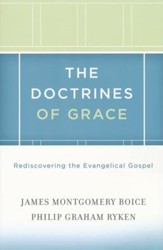Quotes about Free_Will
If God actually stood powerless before the majesty of man’s lordly will, there would be but little use to pray for Him to convert any one. It would then be more reasonable for us to direct our petitions to the man himself.
Free-will tears the reins of government out of the hands of God, and robs Him of His power. It places the creatures beyond His absolute control and in some respects gives them veto power over His eternal will and purpose. It even makes it possible that angels and saints in heaven might sin, that there might again be a general rebellion in heaven such as is supposed to have occurred when Satan and the fallen angels were cast out, and that evil might become dominant or universal.
Much zeal is shown for the freedom of man’s will; little jealousy seems to be left for the freedom of God’s will. Men insist that it is unjust and tyrannical in God to control their wills, yet see nothing unjust, nothing proud, nothing Satanic in attempting to fetter and direct the will of God. Man, it seems, cannot have his own foolish will gratified, unless the all-wise God will consent to relinquish His! Such are some of the steps in the march of Atheism. Such are the preparations making in these last days by the wily usurper for dethroning the Eternal Jehovah.
We must not misconstrue God’s sovereignty so as to make people mere puppets, so we must not press man’s freedom to the point of limiting God’s sovereignty.
Trusting God, 1988, p. 69. Used by permission of NavPress – www.navpress.com. All rights reserved. Get this book!
God can restrain not only people’s actions, but even their most deeply rooted desires. No part of the human heart is impervious to God’s sovereign but mysterious control.
Trusting God, 1988, p. 64. Used by permission of NavPress – www.navpress.com. All rights reserved.
So while the Bible asserts both God’s sovereignty and people’s freedom and moral responsibility, it never attempts to explain their relationship.
Trusting God, 1988, p. 67. Used by permission of NavPress – www.navpress.com. All rights reserved.
Men are not sinners because they choose to sin; they choose to sin because they are sinners.
Man’s Will-Free Yet Bound, The Banner of Truth magazine, Issue 140, by permission Banner of Truth, Carlisle, PA. May 1975.
God never forces men to act against their wills. By workings of outward providence or of inward grace, the Lord may change men’s minds, but He will not coerce a human being into thoughts, words or actions.
Man’s Will-Free Yet Bound, The Banner of Truth magazine, Issue 140, by permission Banner of Truth, Carlisle, PA. May 1975.
Indeed, in conversion, a man must make a decision. We shy away from that term because in modern jargon a “decision” has come to be identified with an outward expression, such as raising the hand or going forward to the front. While such external acts have nothing to do with forgiveness of sins, the heart must make a decision to be saved.
Man’s Will-Free Yet Bound, The Banner of Truth magazine, Issue 140, by permission Banner of Truth, Carlisle, PA. May 1975.
When a sinner refuses to come to Christ, he is guilty because he has made a free choice. It reflects his own state of mind, feeling and attitude toward God and His Son. He has acted voluntarily without coercion. It is his decision.
Man’s Will-Free Yet Bound, The Banner of Truth magazine, Issue 140, by permission Banner of Truth, Carlisle, PA. May 1975.
If the will were able to make decisions contrary to reason, and to the likes and desires of the heart, it would be a monster… This is most profoundly true in the moral and religious realms. When the mind is at war with God, denying His truth; when the emotions hate Christ His Son; when the desires wish God’s law and gospel were exterminated from the earth; the will cannot be in a position to choose Christ. If it were, a man would not be truly free to be himself. Here is the tragic truth about man’s will. While free from outward coercion, it is in a state of bondage. It is not in a stated neutrality. It is not a lever with which to move a man’s personality from sin to righteousness, from unbelief to faith.
Man’s Will-Free Yet Bound, The Banner of Truth magazine, Issue 140, by permission Banner of Truth, Carlisle, PA. May 1975.
Man is like a tree. His heart, not his will alone, is the root. There is no possible way by which the will can choose to produce fruit contrary to the character of the root. If the root is bad, the tree is bound by its very nature to produce evil fruit. Man is like a person standing alongside his treasure chest. There is no possibility of bringing pure gold out of a box filled only with rusty steel. The contents of the heart determine what words and deeds may be brought out. Far from being neutral, the will must reach into the heart for its choices. Every thought, word and deed will partake of the nature of the treasure within. Man is like a stream which cannot rise above its source. If the fountain is polluted, the outflow will be evil. If the source be sweet, the stream will not be bitter and cannot choose to be so. These three illustrations alike contain the same lesson. What a man is determines what he chooses. Choices of the will always reveal the character of the heart, because the heart determines the choices.
Man’s Will-Free Yet Bound, The Banner of Truth magazine, Issue 140, by permission Banner of Truth, Carlisle, PA. May 1975.
We should observe that God does not send anyone to hell. He desires that none should perish (2 Pet. 3:9). God created humans to have fellowship with Him and provided the means by which they can have that fellowship. It is a human’s choice to experience to agony of hell. His or her own sin sends the person there, and his or her rejection of the benefits of Christ’s death prevents escape. As C.S. Lewis has put it, sin is the human being saying to God throughout life, “Go away and leave me alone.” Hell is God’s finally saying to the human, “You may have your wish.”
Christian Theology, Baker, 1998. Get this book!
Freewillism is that doctrine that says, “God loves you, Christ died for you, and the Holy Spirit is calling you; but it will all be vain unless you choose to be saved.” Freewillism makes the determining factor in salvation to be the will of man. It makes the work of the Triune God and the grace of God to be impotent without the consent of man’s “freewill.” Freewill religion is in direct opposition to the gospel of the free grace of God. The Bible declares that salvation is not accomplished, determined by, or dependent upon the will of man, but by the will of God (John 1:12-13; Rom. 9:16). The word “freewill”, when used with reference to salvation is a blasphemous obscenity!
Some people are fond of debating whether or not we have free will. The Bible’s answer is that it depends on what you mean by “free.” If by “free” you mean that we do what we want to do, that nothing forces us to believe or to act against our will, then the Bible’s answer is “yes.” Our will is always free to act in accord with its nature. But if by “free” you mean that somehow our will is morally neutral and above the fray, able to choose between good and evil on its own merits, independent of predisposition or motive, then the answer is a clear and unequivocal “no.” Our nature is corrupted and, as Paul says, we are sold as slaves to sin. We can no more choose not to be sinners than a fish can choose not to be a swimmer. It’s our nature.
The Story of the Fall by Michael Lawrence taken from Biblical Theology by Michael Lawrence, copyright 2010, Crossway Books, a division of Good News Publishers, Wheaton Illinois 60187, www.crosswaybooks.org. Page 136.
If any man ascribes anything of salvation, even the very least thing, to the free will of man, he know nothing of grace, and he has not learned Jesus Christ rightly.
How in the world can God take every decision, every act, with all its implications by every human being on the planet, leaving them a certain amount of limited autonomy to make their own choices for which they are culpable, and overrule all of that so that it all comes together perfectly into the tapestry of His own divine purpose? And that with all the contingencies – incalculable, infinite contingencies – everything ends up exactly the way God designed it to end up before He created anyone. That is a massive, massive mind and inexplicable, incomprehensible power.
Table Talk on Trouble and Triumph, Part 1. The sermon originally appeared at: (https://www.gty.org/library/sermons-library/42-270/table-talk-on-trouble-and-triumph-part-1) at www.gty.org. © 1969-2008. Grace to You. All rights reserved. Used by Permission.
The doctrine of concurrence affirms that God directs, and works through, the distinctive properties of each created thing, so that these things themselves bring about the results that we see. In this way it is possible to affirm that in one sense events are fully (100 percent) caused by God and fully (100 percent) caused by the creature as well. However, divine and creaturely causes work in different ways. The divine cause of each event works as an invisible, behind-the-scenes, directing cause and therefore could be called the “primary cause” that plans and initiates everything that happens. But the created thing brings about actions in ways consistent with the creature’s own properties [which God unchangeably gave and sustains], ways that can often be described by us or by professional scientists who carefully observe the processes. These creaturely factors and properties can therefore be called the “secondary” causes of everything that happens, even though they are the causes that are evident to us by observation (Wayne Grudem and Jeff Purswell).
Bible Doctrine: Essential Teachings of the Christian Faith, Zondervan, www.zonderan.com, 1999, p. 145.
No one can enter the kingdom without the invitation of God, and no man can remain outside of it but by his own deliberate choice. Man cannot save himself; but he can damn himself (T.W. Manson).
To suppose that whatever God requireth of us that we have power of ourselves to do, is to make the cross and grace of Jesus Christ of none effect.
Something terrible has happened to us. We have lost all desire for God. The thoughts and desires of our heart are only evil continuously. The freedom of our will is a curse. Because we can still choose according to our desires, we choose sin and this we become accountable to the judgment of God.
Taken from: Essential Truths of the Christian Faith by R. C. Sproul, Copyright © 1992 (Sproul), p. 180, Used by permission of Tyndale House Publishers, Inc. All rights reserved.
If the final decision for the salvation of fallen sinners were left in the hands of fallen sinners, we would despair all hope that anyone would be saved.
[We without God have] wills that choose…the problem is that even though we have the power to choose, we are dead to the things of God, and as a result have no desire for the things of God. Rather, we follow a different course. We follow it willfully; we follow it freely, in the sense of doing what we want to do. But with respect to spiritual things, we are dead.
The Purpose of God, An Exposition of Ephesians, Christian Focus Publications, 1994, p. 47.
Man’s will is free to follow his inclinations, but fallen man’s inclinations are always and invariably away from God.
Our opponents say, “Salvation belongs to the free will of man; if not to man’s merit, yet at least to man’s will;” but we hold and teach that salvation from first to last, in every iota of it, belongs to the Most High God. It is God that chooses His people. He calls them by His grace; He quickens them by His Spirit, and keeps them by His power.
It always seems inexplicable to me that those who claim free will so very boldly for man should not also allow some free will to God. Why should not Jesus Christ have the right to choose his own bride?
Free will carried many a soul to hell, but never a soul to heaven
Free will I have often heard of, but I have never seen it. I have met with will, and plenty of it, but it has either been led captive by sin or held in blessed bonds of grace.
I do not come into this pulpit hoping that perhaps somebody will of his own free will return to Christ. My hope lies in another quarter. I hope that my Master will lay hold of some of them and say, "You are mine, and you shall be mine. I claim you for myself." My hope arises from the freeness of grace, and not from the freedom of the will.
Once there was free will in paradise, and a terrible mess free will made there, for it spoiled all paradise and turned Adam out of the garden. Free will was once in heaven, but it turned the glorious archangel out, and a third part of the stars of heaven fell into the abyss. I want nothing to do with free will, but I will try to see whether I have got a free will within. And I find I have. Very free will to do evil, but very poor will to do that which is good.
Free-will doctrine – what does it? It magnifies man into God; it declares God’s purposes a nullity, since they cannot be carried out unless men are willing. It makes God’s will a waiting servant to the will of man, and the whole covenant of grace dependent upon human action. Denying election on the ground of injustice it holds God to be a debtor to sinners, so that if He gives grace to one He is bound to do so to all. It teaches that the blood of Christ was shed equally for all men and since some are lost, this doctrine ascribes the difference to man’s own will, thus making the atonement itself a powerless thing until the will of man gives it efficacy. Those sentiments dilute the scriptural description of man’s depravity, and by imputing strength to fallen humanity, rob the Spirit of the glory of His effectual grace: this theory says in effect that it is of him that willeth, and of him that runneth, and not of God that showeth mercy.
A man is not saved against his will, but he is made willing by the operation of the Holy Ghost. A mighty grace which he does not wish to resist enters into the man, disarms him, makes a new creature of him, and he is saved.
All people freely and voluntarily and willingly reject the gospel because it is their heart’s desire to do so. A person’s freedom consists in the ability to act according to one’s desires and inclinations without being compelled to do otherwise by something or someone external to himself. So long as one’s choice is the voluntary fruit of one’s desire, the will is free. This is what I mean when I say, “Yes, all people are free moral agents.” On the other hand, to say that a person has free will is to say that he has equal ability or power to accept or reject the gospel. It is to say that he is as able to believe as to disbelieve, and that this ability springs from his own making and is native to him notwithstanding his fallen and sinful state. If this is what you mean when you ask me, “Is man free?” my answer, or rather, the answer of the Bible, is “No.” A man’s will is the extension and invariable expression of his nature. As he is, so he wills. A man is no more free to act or to will or to choose contrary to his nature than an apple tree is free to produce acorns.
Freedom and Depravity – Part II, November 6, 2006, www.enjoyinggodministries.com. Used by Permission.
We are not kept from believing against our wills. “The one who comes to Me,” declares Jesus, “I will certainly not cast out” (John 6:37b). The problem, however, as Jesus goes on to say, is that “no one can come to Me, unless the Father who sent Me draws him” (John 6:44a; italics added).
Freedom and Depravity – Part II, November 6, 2006, www.enjoyinggodministries.com. Used by Permission.
The question, then, is this: Does the Bible teach that people have the power and initiative within their own will to believe the gospel? The question is not, “Are people morally responsible for their actions?” The Bible declares that we are. We are responsible to God for every act of will and work that we perform. Neither is the question, “Do people have the opportunity to believe?” The Bible declares that we do. God has made Himself known to all people, either in nature, conscience, or the gospel, so that all are without excuse (Rom. 1:18-23; 2:14-16; Ac. 14:16-17). The question, rather, is this: Do people have a free and unfettered will by which they are able to believe? The Bible declares that they do not. The teaching of Scripture is that all people are born into this life corrupt in nature and therefore ill-disposed to the gospel and to the truth. This is the doctrine of total depravity.
Freedom and Depravity – Part I, November 6, 2006, www.enjoyinggodministries.com. Used by Permission.
A man’s free will cannot cure him even of the toothache, or a sore finger; and yet he madly thinks it is in its power to cure his soul. The greatest judgment which God Himself can, in the present life, inflict upon a man is, to leave him in the hand of his own boasted free will. Look where you will, and you will generally find that free-willers are very free livers. According to Arminianism, grace has the name, but free-will has the game.
The important thing about a man is not where he goes when he is compelled to go, but where he goes when he is free to go where he will.
The friends of free-will are the enemies of free-grace.
A Puritan Golden Treasury, compiled by I.D.E. Thomas, by permission of Banner of Truth, Carlisle, PA. 2000, p. 130.
Everything will happen as God’s will has determined, but the freedom of people to choose their actions is not infringed. Indeed, the freedom of moral agents is ratified, because in His will He has determined that free agents will act freely. For example, in God’s will it was impossible for the soldiers to break Christ’s bones. But no coercion was laid upon them: they were free agents, who freely chose not to break them.

